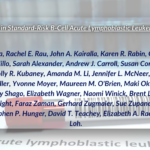
The 66th American Society of Hematology (ASH) Annual Meeting has successfully concluded, bringing together over 30,000 experts and scholars worldwide. Through meticulously curated sessions, the conference provided profound insights into fundamental research, innovative therapies, and disease management in hematology. To highlight the latest developments, Hematology Frontier presents the News of ASH series, offering key takeaways from ASH’s official reports.Ketone Fuel: The Role of Dietary Interventions in CAR-T Therapy
Dietary adjustments are a major concern for cancer patients, many of whom ask: “How should I modify my diet to support my treatment?” A groundbreaking study presented at ASH 2024, titled “Ketogenic Diet Enhances CAR T Cell Antitumor Function Via β-Hydroxybutyrate”, provided new insights into this question.
In his plenary session, Dr. Marco Ruella from the University of Pennsylvania detailed the journey from initial hypothesis to transformative discovery, revealing how dietary factors can profoundly influence CAR-T cell therapy outcomes. The research stemmed from a chance academic exchange when microbiologist Dr. Mayaan Levy, who studies the role of diet in cancer progression, presented her findings at an immunology seminar. Intrigued by the potential connection between diet and immune function, Ruella and Levy decided to collaborate on exploring how dietary interventions might enhance CAR-T therapy efficacy.
Investigating the Impact of Diet on CAR-T Therapy
Their study was based on a core hypothesis: different dietary patterns might influence the effectiveness of CAR-T therapy in cancer treatment. To test this, the team used immunocompetent mice implanted with diffuse large B-cell lymphoma (DLBCL) tumors and assigned them to different dietary regimens, including high-fiber, high-fat, and ketogenic diets. The mice then received anti-CD19 CAR-T cell infusions, with researchers assessing tumor control and overall survival across the dietary groups.
“As an Italian, I was naturally inclined to support a Mediterranean high-fiber diet,” Dr. Ruella joked. However, the results were surprising—the ketogenic diet significantly enhanced CAR-T cell efficacy.
Further analysis revealed that improved tumor control and CAR-T cell expansion in ketogenic diet-fed mice were closely linked to β-hydroxybutyrate (BHB), a key ketone body produced during ketosis. “The findings were striking,” Ruella emphasized. “BHB appears to optimize T-cell metabolism, enhancing oxidative phosphorylation and significantly improving their antitumor capabilities.” Importantly, the benefits of BHB extended beyond the DLBCL model. When administered orally to mice undergoing mesothelin-targeted CAR-T therapy for pancreatic cancer and CD19 CAR-T therapy for acute lymphoblastic leukemia, BHB consistently promoted CAR-T expansion and improved tumor control.
Translating Laboratory Discoveries to Clinical Applications
To validate these laboratory findings, Ruella and Levy analyzed previously collected samples from patients enrolled in CD19 CAR-T cell clinical trials for DLBCL. Their results confirmed that patients with higher BHB levels exhibited greater CAR-T cell expansion and enhanced therapeutic response. Encouraged by these findings, the team quickly moved from preclinical research to clinical investigation, launching an interventional study to assess the impact of BHB supplementation in cancer patients undergoing CAR-T therapy.
When asked whether patients should adopt a ketogenic diet, Ruella acknowledged the challenges of implementing strict dietary regimens. “Maintaining a long-term ketogenic diet is difficult, and adherence may be low,” he explained. Instead, BHB supplementation is emerging as a more practical and effective alternative.
Balancing Scientific Rigor and Personal Dietary Choices
When asked if he had personally tried the ketogenic diet, Ruella laughed and admitted, “Never! I’ve always believed in a balanced diet—vegetables, fruits, and moderate amounts of meat—because that aligns better with our natural dietary habits as primates.” His reflections highlight the broader role of nutrition in overall health. When pressed on what high-fat ketogenic foods he would choose if stranded on a “keto island,” he responded without hesitation: “Avocados, definitely—not endless bacon or cheese!”
A Paradigm of Translational Science
Ruella and Levy’s research exemplifies the power of translational science—bridging laboratory discoveries with real-world clinical applications. “This study’s success was made possible by strong interdisciplinary collaboration,” Ruella emphasized. “Our partnership with Dr. Levy’s team truly embodies teamwork, leading to meaningful scientific advancements. This is the essence of synergy—combining expertise in cancer biology and metabolism to improve patient outcomes.”
By integrating dietary insights with CAR-T therapy, this research paves the way for novel strategies to enhance treatment efficacy, offering a promising new avenue in precision medicine.


